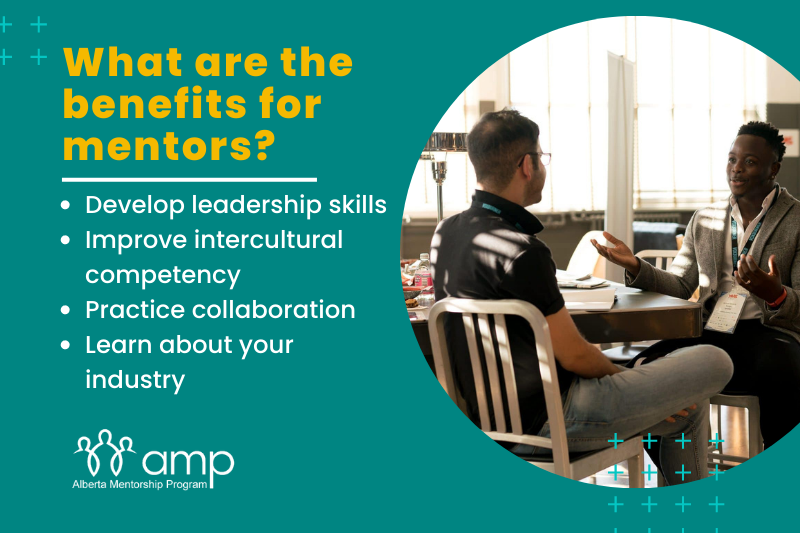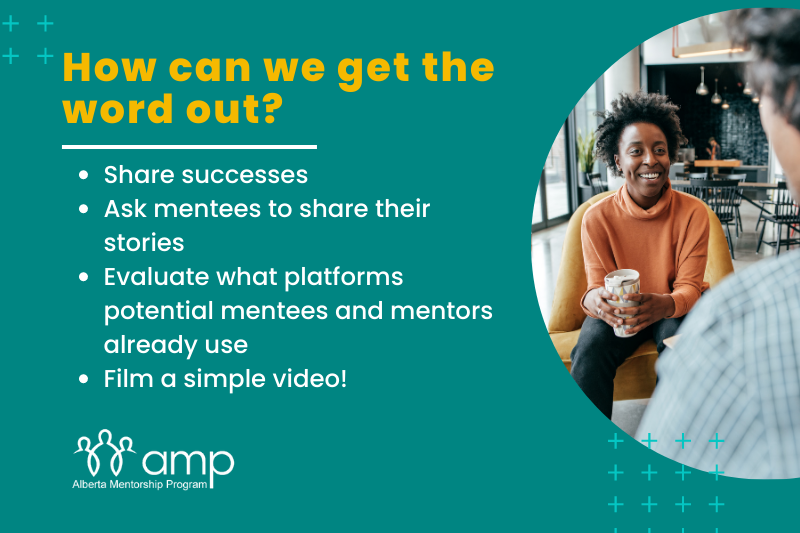On November 18, 2022, our Community Champion Mentoring Circle met to discuss recruiting and retaining members. The discussion was led by former mentee Sarah Tangan, Mentorship Director at the Edmonton Region Immigrant Employment Council (ERIEC), and Najib Mangal of Lethbridge Family Services, and was followed by a question and answer session.
Read more: Community Champion Mentorship Circle: Strategies to Recruit and Retain Mentors

What are the benefits for mentors?
One challenge in recruiting mentors and mentees is asking them to take time away from paid work or family life to volunteer. Some may expect financial compensation and be unable to participate without it. If a potential mentor needs to be paid for financial stability, they may not have time to volunteer right now. Others may respond to stories of personal successes, facts, or statistics to help understand the non-financial benefits of mentoring.
“There are benefits to mentors in terms of leadership training and intercultural training,” says Doug Piquette, Executive Director of ERIEC.
“We also have the connector program, a smaller time slot allotted for people to make a one-time connection. It's a very short connection point for the mentee to meet with somebody from their professional sector, which serves the mentor and the mentee who may not have much free time.”
Read more:
What happens when a mentee has a background in one field and wants to pursue something different?
“We accommodate clients who would like to transition into another industry,” says Sarah Tangan. “Provided they are making an effort or taking courses relevant to that transition.”
“Accurate assessment has to happen at the beginning of the process,” says Najib Mangal of Lethbridge Family Services. “We need to dissect their needs, connect them with the right people and help them align their goals with reality, which can take some time.”
“We strategically pair them with experts, professionals, and colleagues, and that’s where they can get the information they need to make an informed decision. All the clients we work with are capable; they may just need help to analyze and evaluate their options,” adds Doug Piquette.

How can we get the word out to potential mentees?
Sharing in Successes
“Visibility is helpful,” says Sarah Tangan. “I had one mentor reach out to me very excited to say, ‘I’ve been away from the program, but you’re posting a lot of successes, and I want to be a part of it.’ People like to see real faces, real successes. When we post success stories, we share them with mentors, and they can also be shared with the wider LinkedIn community.”
“Additionally, reaching out to successful mentees to ask for a short blog helps to continue those success stories. Sometimes they’ll be nervous because writing in English might not be a strength. But that’s where we can assure them that they’ll be supported to do that, and we can polish it and post it on their behalf.”
Reaching them where they are
Kemoh Mansaray of the Lloydminster Local Immigration Partnership recommends sharing videos on WhatsApp in addition to other social channels. “When you send WhatsApp messages, people get them easily because it’s in their hands. Not everyone goes on Facebook, so WhatsApp gets to them more easily.”
Video sharing
On the subject of sharing videos, Annette Wierstra from Scriptorium Professional Writing Service suggests that a ‘good enough’ video can be just as effective as a professional video for getting the message out on social media.
“One of the things happening right now as more people use Tiktok, and now Instagram and Facebook Reels, the bar for video quality has been somewhat lowered. You can create video quickly and easily on your phone and it feels more authentic than professionally produced video. Little things like going around capturing moments, little quotes from your team, from your mentors and mentees, and collecting them to use on social media will help get the word out!”
A regional approach to mentorship?
Mentorship programs will look slightly different in every region. There is some concern about how to sell mentorship to participants in smaller communities who may not see themselves reflected in the same programming that dominates larger urban centres. As the discussion unfolded, the mood was excited and hopeful, the consensus being that, yes! Smaller communities want and need to be included. In some cases, this might require extending reach to attract mentors in related fields, but partnerships with other organizations, even informal ones, can help make connections. Don’t be afraid to reach out to organizations in smaller communities.
“When we completed the environmental scan, we were really surprised with the kind of work that’s being done already, in terms of building capacities in small communities,” says Doug Piquette. “You know, communities are there – and they’re ready! One of the questions we ask is, is this part of your strategy? What are you doing to attract people? Attract a brain trust?”
“How can mentorship play a role in integrating newcomers into the community?” Asks Ricardo Morales, CCIS, Calgary. Rural communities, like urban centres, can benefit from creating a welcoming environment for newcomers to set them up for future success. “If you’re able to connect a client to a job that meets their needs, they may feel more connected to the community.”
If you’re interested in regional collaboration in rural Alberta and other areas, we encourage you to read more about the research conducted in our environmental scan.
The Alberta Mentorship Program is appreciative of the funding from the Government of Alberta through Labour and Immigration, Workforce Strategies. Our program is here to provide information and support to help organizations start mentorship programs.